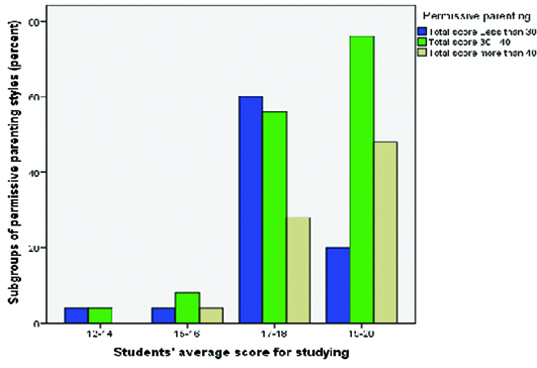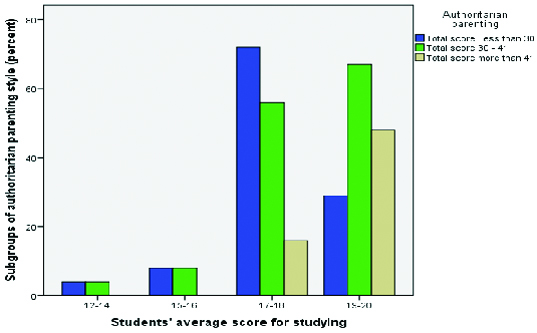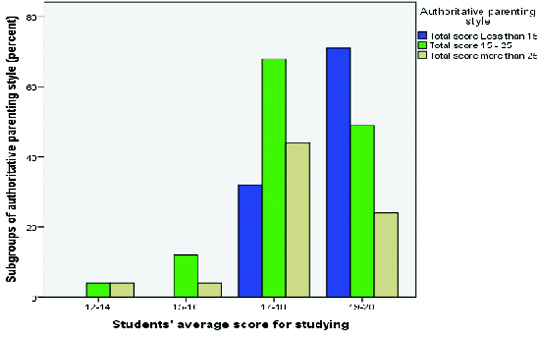Parenting style is defined as psychological construct that represent parents strategies use on their child [1]. The parenting style has an important effect on all stages of human life in pre-school leading to college [2].
As will know adolescence is a particular period of human development and adolescents are influenced by multiple socialization agents, including their parents, teachers, and peers [1].
The first scientific study began in the 1980s on the impact of parenting styles on children outcome. Therefore, researchers purposed several parenting typology [3,4]. Baumrind’s parenting typology is one of the most common theories that identified three initial parenting styles including; authoritative parenting, authoritarian parenting and permissive parenting [5]. An authoritarian parenting is very willing but less responsive to their children. These parents emphasize on unconditional obedience of children and lack warmth, intimacy and support. The authoritative parents are both demanding and responsive. This parenting style is characterized by three components including; warmth, control and democracy. Actually, the parents with authoritative parenting style have a high demand of responsibility and parenting. The authoritative parents apply the logic in dealing with their children. Other features of this parenting style are use appropriate support and sympathize with the children. Permissive parenting is another parenting style that can be seen between the parents. In this style, the parents serve their children while do not have expectation and control on their children [6].
Positive parenting styles are included; coping with another, being self-reliant and independence [7]. However, several studies reported the relationship between parenting styles and educational performance of their child [8,9], (self-control, addiction to computer games [10], self-esteem [11], but also, an Iranian study evaluated the impacts of parenting styles on educational progress of adolescents. The result demonstrated that parenting styles have not significantly affect on educational progress [10].
Authoritative parenting styles are related to the success of the shoal. A large study reported the highest successful educational progress in high school students with authoritative parenting styles, while the lowest successful educational progress reported in the students whose parents were authoritarian. The results of another study indicate that, however, there is a significant relationship between the permissive parenting style and students’ educational progress, but also there wasn’t association between other parenting styles and students’ educational progress [12].
With regard to impact of parenting styles on children’s outcome, the aim of the present study was to investigate the relationship between the parenting styles and students’ educational performance among Iranian girl high school students.
Materials and Methods
In a cross–sectional survey, female students in high schools of Ilam (Iran) evaluated during the academic year 2014-15.
Multistage random sampling was used to select the participants. In the first stage were selected five females’ high schools from different regions of Ilam. Consequently, 450 female students in all stages of high school were selected randomly as the sample group of the research.
This study was undertaken with the approval of the Ethical Committee of the Islamic Azad University of Ilam, Iran. The aim of the study was described an informed consent was obtained from all participants before the enrollment in the study. To enhance confidentiality, all questionnaires were completed anonymously and only required information was collected.
To obtain parents’ consent for participation in the study, school principals sent them a Academic letter if rewarding, complete the study questionnaires. Questionnaires with incomplete or chaotic information were eliminated from the research process. Finally, information from 400 questionnaires was analysed.
Demographic information questionnaire: This questionnaire was designed by the authors and assessed variables such as age, education level, and students’ average score for studying. The variables such as parents’ occupation were divided into two groups including governmental and non-governmental groups. Also in parents’ education variable, the participants were divided into five groups including, illiterate, primary, secondary, diploma and academic education levels.
Baumrind’s parenting styles questionnaire (1978): This is a famous questionnaire contains 30 questions and placed parenting styles in 3 sub-groups including; authoritarian parenting styles (questions: 1,6,10,13,14,17,19,21,24,28), authoritative parenting styles (questions: 2,3,7,9,12,16,18,25,26,29) and permissive parenting styles (questions: 4,5,8,11,15,20,22,23,27,30). A Likert scoring was used to determine the participant’s responses including; 5: always, 4: frequently, 3: occasionally, 2: seldom, and 1: never. The Cronbach’s alpha coefficient was measured as an index of internal identicalness of the questionnaire to verify its reliability. The obtained values were 0.78 for the whole test and 0.71, 0.75 and 0.88 for the three subscales mentioned above.
Results
A total 400 students were studied. The Mean±SD of the students’ age were 14±1.08. The students’ school grades were the first year of high school to pre-university course. The Mean±SD of parenting styles were 35.37±5.8, 34.69±6.34 and 19.17±6.64 for permissive parenting style, authoritarian parenting style and authoritative parenting styles, respectively. There was a statistical relationship between mother’s occupation, parents’ education and parenting styles. The parents’ characteristics are presented in [Table/Fig-1].
The parents’ characteristics in study participants
| Characteristics | N (%) | Scores of parenting style (Mean±SD) |
|---|
| Permissive | Authoritarian | Authoritative |
|---|
| Father’s occupation |
| Governmental | 219(54.8) | 35.11 ± 5.96 | 35.42 ± 6.85 | 19.15 ± 7.24 |
| Non-governmental | 181(45.2) | 35.69 ± 5.62 | 33.8 ± 5.56 | 19.19 ± 5.87 |
| P-value | | 0.322 | 0.01 | 0.955 |
| Mother’s occupation |
| Governmental | 51(12.8) | 35.08 ± 5.94 | 37.29 ± 6.75 | 15.59 ± 5.46 |
| Non-governmental | 349(87.2) | 35.37± 4.37 | 34.31 ± 6.21 | 19.7 ± 6.64 |
| p-value | | 0.000 | 0.004 | 0.000 |
| Father’s education |
| Illiterate | 12(3) | 31.33± 1.36 | 27.67± 2.56 | 20.66 ± 1.78 |
| Primary | 40(10) | 34.6 ± 0.918 | 31.7± 0.99 | 24.4 ± 1.09 |
| Secondary | 148(37) | 34.57 ± 0.55 | 33.5± 0.44 | 19.27± 0.53 |
| Diploma | 36(9) | 34 ± 1.02 | 33.89± 0.7 | 21± 1.03 |
| Academic | 164(41) | 36.88 ± 0.355 | 37.58± 0.47 | 18.27 ± 0.52 |
| p-value | | 0.000 | 0.000 | 0.000 |
| Mother’s education |
| Illiterate | 44(11) | 32.91 ± 0.85 | 31.27 ± 1.14 | 21 ± 1.1 |
| Primary | 44(11) | 33.91 ± 1.07 | 32.45 ± 0.85 | 18.34 ± 1.2 |
| Secondary | 152(38) | 36.32 ± 0.46 | 36.55 ± 0.48 | 19.05 ± 0.49 |
| Diploma | 69(17.2) | 33.43 ± 0.71 | 31.38 ± 0.49 | 20.44 ± 0.71 |
| Academic | 91(22.8) | 37.15 ± 0.46 | 36.81 ± 0.64 | 17.79 ± 0.72 |
| p-value | | 0.000 | 0.000 | 0.000 |
The score range of permissive parenting style was 16-46 and total score of 30 (18% of all participants) was the most common score among permissive parenting style. The score range was 16-48 and 10-33 for authoritarian parenting style and authoritative parenting style, respectively.
There was a significant relationship between the score of permissive parenting style (p= 0.001, r= 0.151), authoritarian parenting style (p= 0.001, r= 0.343) and authoritative parenting style (p= 0.001, r= 0.261) with the students’ average score for studying. The students’ average score for studying is increased in the higher score of all parenting styles. Based on the total scores of parenting styles, the parents were divided into three subgroups. The first group obtained less than 25% of total scores from of each parenting style. While the second and third groups obtained 25-75% and more than 75% of total scores from each parenting style. The results are presented in [Table/Fig-2,3 and 4].
Students’ average score for studying based on permissive parenting style.

Students’ average score for studying based on authoritarian parenting style.

Students’ average score for studying based on authoritative parenting style

Discussion
In the present study we investigated the relationship between the parenting styles and students’ educational performance among Iranian female high school students.
Based on the results of the present study, there was a significant relationship between mother’s occupation, parents’ education and parenting styles. So far, researchers have studied the impact of female education and occupation on different aspects of their life [13–15]. Dehart, et al., reported the relationship between mother’s occupation and authoritative parenting styles [16]. In other hand, the parents have an important role to children health and high levels of self-esteem [11]. Undoubtedly, the students’ mental health is one of the most effective factors on both students’ learning and students’ performance [17,18]. However, previous studies have shown a significant relationship between students’ mental health and increasing the learners’ abilities and students’ achievement [19,20], but also mothers with authoritative parenting style have more positive interactions with their child. Therefore, authoritative parenting styles mothers have children with more self-respect [11]. Another Iranian research confirmed the effect of parenting style on students’ educational achievement [21]. Nevertheless, all parents would like their children to succeed in school, but also, all parents aren’t successful in the practice [22]. Therefore, several study pay to attention the relationship between parenting styles and students’ educational performance [1,9,11,21].
Our findings indicated that the permissive parenting style and authoritative parenting styles have the highest and lowest Mean±SD of parenting style. In a cross-sectional study enrolled 261 Iranian school students of public schools to study. However, the results demonstrate a high correlation between assertive parenting style and student academic achievement, but also, other parenting styles had negative correlation with academic achievement [23].
Another finding obtained in this study was that the authoritarian parenting style has the highest coloration with the students’ average score for studying (r= 0.343). Parenting styles have not the similar power in all ethnic groups. On the other hand, in the Asian American parents the authoritarian is a predictor of poor academic achievement. Hence, the Asian American students have lower academically successful [24].
Analysis of research data indicates that there are a significant association between the parenting style and the students’ average score for studying. A study demonstrates the positive relationship between the authoritarian parenting style and the academic among 262 Indian students in the first grade of theoretical high schools [21]. Another study reported the parents’ viewpoint, interactive approaches, and behaviour as effective factors on students’ educational performance [25]. Other studies evaluated the relationship between parenting characteristics and academic performance in college students and reported the parenting behaviours as important factors in the lives of college students [22,26,27].
Considering there are several effective factors in student’s educational achievement, including; motivational variables, teaching practices and classroom construction, therefore, we recommended further studies in order to find the effect of each factor with a more assertive methods and more advanced processing.
Conclusion
The results of this study demonstrate that parental influence plays an important role in students’ educational performance.